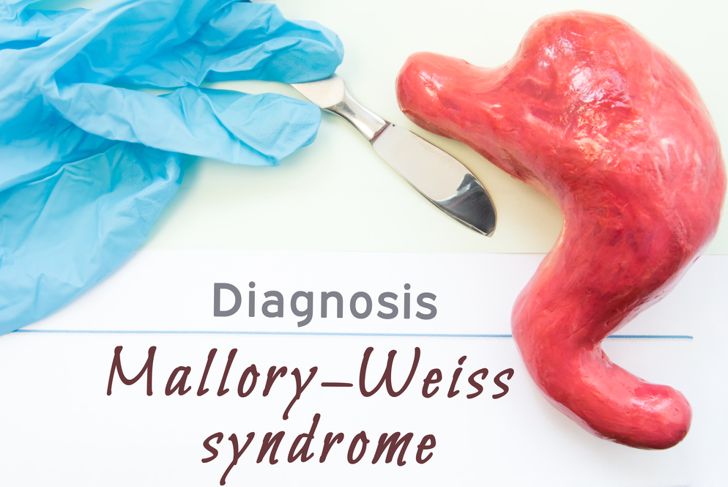Mallory-Weiss syndrome occurs as a tear or laceration in the upper part of the stomach and the lower esophagus. Forceful retching, coughing, vomiting, or even hiccups cause it. This tear may rupture blood vessels and induce bloody vomit when the person throws up. Mallory-Weiss tears make up about 5 percent of hemorrhages or bleeding incidents in the upper GI tract. This symptom was first described in alcoholics, but a person doesn’t need to be an alcoholic to have this condition.
Symptoms of Mallory-Weiss Syndrome
People who have Mallory-Weiss syndrome may not know that they have it unless they vomit. Mallory-Weiss Syndrome is characterized by bloody vomit and occasionally black, tarry stools. The bloody vomit may be severe, or it may be light. The blood in the vomit will be bright red as though it just came from a blood vessel.
How Mallory-Weiss Syndrome is Diagnosed for Mild Bleeding
Doctors diagnose Mallory-Weiss Syndrome first by examining the symptoms. Did the patient first vomit without blood and then vomit with blood? This could be a clue for a tear in the esophagus. If the bleeding is minor and there is a case history of vomiting without blood, then the doctor may proceed to treat for Mallory-Weiss Syndrome without further testing.
How Mallory-Weiss Syndrome is Diagnosed for Severe Bleeding
About 10 percent of Mallory-Weiss Syndrome cases are serious and have severe bleeding. If the bleeding is serious or if there is no history of vomiting without blood before the episode, the doctor may perform an upper endoscopy to see the tear. The endoscope enters through the person’s mouth into the esophagus using a flexible tube. The doctor can then see if there is a tear, or even be able to repair it.
Other Ways Mallory-Weiss Syndrome is Diagnosed for Severe Bleeding
If the bleeding is rapid or extremely severe, doctors may choose to perform an angiography. With the angiography, doctors use a catheter filled with special dye that shows up on an x-ray and injects the artery they think might be causing the blood loss. The doctors can then pinpoint the rupture and develop a plan for repairing the damage.
How Mallory-Weiss Syndrome is Treated for Mild Cases
In most cases, if the bleeding is mild, once the doctor has diagnosed the condition as Mallory-Weiss Syndrome, the doctor will allow the patient to heal on their own without intervention. Assuming there is no more forceful vomiting, the esophagus tear will heal on its own. The doctor may treat the vomiting to ensure that no further damage is done to the esophagus.
How Mallory-Weiss Syndrome is Treated for Severe Cases
Occasionally Mallory-Weiss Syndrome can lead to severe bleeding. If the bleeding is continuous or severe, steps can be taken to correct the esophagus tear. Many times, this can be done while the doctor is performing an upper endoscopy on the patient. The doctor may clip the blood vessel closed, cauterize the blood vessel or inject medication that will cause the blood vessel to close. Rarely, the patient may need blood transfusions.
What Causes Mallory-Weiss Syndrome?
Forceful vomiting, coughing, retching, or even hiccupping causes Mallory-Weiss Syndrome. The force of the vomit tears the esophagus and causes it to bleed. In most cases, the tear is not serious and will heal in time, provided that more injury does not occur. Severe cases require medical assistance to stop the bleeding.
Preventing Mallory-Weiss Syndrome
Mallory-Weiss Syndrome occurs when someone is vomiting, retching, coughing, or hiccupping forcefully. Because it was first diagnosed with alcoholics, it’s a good idea to avoid alcohol and drugs that can cause vomiting. Practicing good hygiene such as washing hands and cooking foods properly and maintaining proper temperatures will help prevent stomach ailments such as norovirus and E. coli, which cause vomiting.
When To Contact A Doctor?
A patient should contact their doctor if they vomit a small amount of blood, or are vomiting forcefully. A patient should also contact their doctor if they have blood in their stools, or if their stools are black and tarry. If the person who is vomiting blood is a child, the parent should take their child to the emergency room immediately.
When Should a Person Go to the Emergency Room?
If a person is vomiting a lot of blood, is forcefully vomiting more than once, or is feeling weak or dizzy, they should go to the emergency room immediately. If they have a fever, are pale, or are losing consciousness, they may have a very serious condition and should seek immediate medical attention.

 Home
Home Health
Health Diet & Nutrition
Diet & Nutrition Living Well
Living Well More
More




















